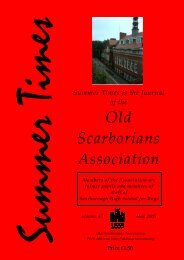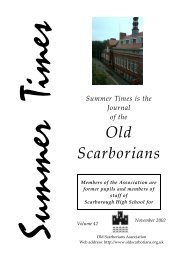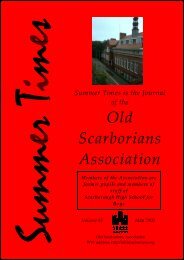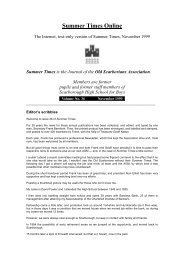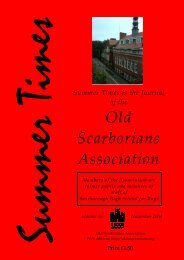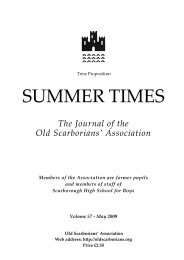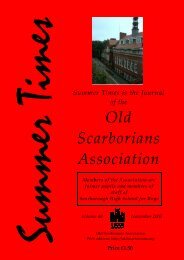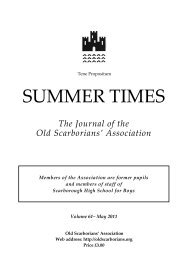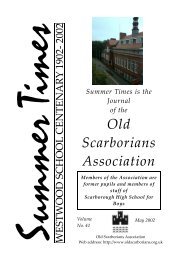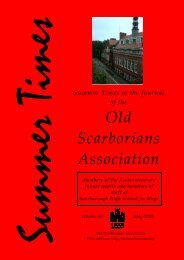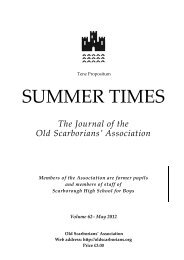Summer Times is the Journal of the Old Scarborians Association
Summer Times is the Journal of the Old Scarborians Association
Summer Times is the Journal of the Old Scarborians Association
You also want an ePaper? Increase the reach of your titles
YUMPU automatically turns print PDFs into web optimized ePapers that Google loves.
some just refused to budge after about a quarter<br />
<strong>of</strong> a mile. The farmer dashed up and down <strong>the</strong><br />
line <strong>of</strong> mules, flogging each in turn. Then a<br />
German observation post must have spotted us,<br />
and <strong>the</strong>ir artillery put down about twenty shells.<br />
The mules did not turn a hair, but <strong>the</strong> farmer set<br />
<strong>of</strong>f back home as fast as h<strong>is</strong> legs could carry him.<br />
Eventually, we got seven mules to our destina‐<br />
tion, and I take my hat <strong>of</strong>f to <strong>the</strong>m, for <strong>the</strong>y had<br />
to carry <strong>the</strong> loads taken from <strong>the</strong> defectors, as<br />
well as <strong>the</strong>ir own. Having reached our destina‐<br />
tion and fired <strong>of</strong>f all our shells, <strong>the</strong>re was <strong>the</strong><br />
question <strong>of</strong> what to do with <strong>the</strong> mules. I would<br />
have liked to have kept <strong>the</strong>m, for <strong>the</strong>y were<br />
certain to prove useful in <strong>the</strong> future, but we had<br />
no food for <strong>the</strong>m and <strong>the</strong>y were a v<strong>is</strong>ible target,<br />
so we pointed <strong>the</strong>m in <strong>the</strong> right direction home,<br />
slapped <strong>the</strong>ir bottoms and <strong>the</strong>y ran out <strong>of</strong> sight<br />
like thoroughbreds.<br />
The Germans made <strong>the</strong>ir first big stand at <strong>the</strong><br />
river Minterno, which flowed between steep<br />
hills. Of course, <strong>the</strong> bridge across <strong>the</strong> river was<br />
blown and <strong>the</strong>y were well dug in on <strong>the</strong> o<strong>the</strong>r<br />
side. Our troops were dug in on <strong>the</strong> slopes op‐<br />
posite. By th<strong>is</strong> time, bridges having been<br />
erected, I had all my carriers, which were sited<br />
behind a small village, just over <strong>the</strong> crest <strong>of</strong> <strong>the</strong><br />
hills. ‘D’ Company was <strong>the</strong> most forward <strong>of</strong> our<br />
companies, dug in on a spur, and it was my job,<br />
every night, to take hot food to <strong>the</strong>m – contain‐<br />
ers full <strong>of</strong> stew, rice pudding, and scalding tea –<br />
which necessitated <strong>the</strong> use <strong>of</strong> three carriers.<br />
There was a narrow track that ran round <strong>the</strong><br />
village down a hill and <strong>the</strong>n up on to <strong>the</strong> spur.<br />
The first three nights we had no problem – <strong>the</strong><br />
moon was shining and our Artillery bombarded<br />
<strong>the</strong> German positions, inter‐alia, to drown <strong>the</strong><br />
sound our carriers made. On <strong>the</strong> fourth, I had<br />
just set <strong>of</strong>f, driving <strong>the</strong> first carrier myself, when<br />
<strong>the</strong> moon went in. I proceeded very carefully<br />
but, just as I had nearly reached <strong>the</strong> bottom <strong>of</strong><br />
<strong>the</strong> hill, <strong>the</strong> carrier sli<strong>the</strong>red to <strong>the</strong> right on meet‐<br />
ing s<strong>of</strong>ter ground and ended up half on <strong>the</strong> track<br />
and half in a field three feet below <strong>the</strong> track.<br />
There was nothing to do but unload it and get<br />
46<br />
<strong>the</strong> o<strong>the</strong>r carriers to pull it out. They could not<br />
get past my carrier anyway, as, though half in<br />
<strong>the</strong> field, it was still blocking <strong>the</strong> narrow track.<br />
We toiled for hours – two towropes snapped –<br />
but we could not get <strong>the</strong> carrier back on <strong>the</strong><br />
road. By using all <strong>the</strong> manpower available, we<br />
were able at last to lever it out and haul it <strong>of</strong>f <strong>the</strong><br />
track completely and into <strong>the</strong> field. When <strong>the</strong><br />
two carriers arrived eventually with <strong>the</strong> food at<br />
‘D’ Company, we were met with extravagant<br />
oaths for being so late!<br />
Having got back to my carrier, we proceeded to<br />
cover it over with soil, because, o<strong>the</strong>rw<strong>is</strong>e, when<br />
daylight came, <strong>the</strong> Germans, who from <strong>the</strong>ir<br />
position in <strong>the</strong> hills m<strong>is</strong>sed nothing, would have<br />
blasted it and <strong>the</strong> village. It took us all nearly<br />
until dawn, and we all had bl<strong>is</strong>ters from con‐<br />
stant use <strong>of</strong> our rough handled shovels.<br />
Just before leaving, we saw a curious sight. Into<br />
<strong>the</strong> field where <strong>the</strong> carrier was buried strolled, I<br />
should think, all <strong>the</strong> inhabitants <strong>of</strong> <strong>the</strong> village,<br />
men, women and children <strong>of</strong> all ages, who <strong>the</strong>n<br />
proceeded to defecate while <strong>the</strong>y chatted hap‐<br />
pily with each o<strong>the</strong>r. When I got back to <strong>the</strong><br />
village, I asked <strong>the</strong> head man, who had learned<br />
Engl<strong>is</strong>h while building American underground<br />
railways, why <strong>the</strong> villagers were not using <strong>the</strong>ir<br />
own toilets. He laughed, ‘In England’, he said,<br />
‘you have horses and <strong>the</strong>refore manure. In Italy<br />
here we have no horses and <strong>the</strong>refore no ma‐<br />
nure, so we ourselves have to fertil<strong>is</strong>e <strong>the</strong> fields,<br />
a different one every morning, ‐‐ and you<br />
should see our crops!’<br />
Some time afterwards, when <strong>the</strong> platoon was in<br />
<strong>the</strong> town <strong>of</strong> Minterno itself, an <strong>of</strong>ficer came up<br />
in a jeep and asked to see <strong>the</strong> Colonel. He said<br />
h<strong>is</strong> name was Len Hobbs, Jack Hobbs’s son, and<br />
he had found Hedley Verity’s grave at Caserta.<br />
Hedley had been taken pr<strong>is</strong>oner and evacuated<br />
to <strong>the</strong> hospital at Caserta, where he was making<br />
such good progress that he was walking around<br />
and helping o<strong>the</strong>rs in <strong>the</strong> ward. Then <strong>the</strong> Italian<br />
doctors found he had gangrene in h<strong>is</strong> chest.<br />
They had to operate on him without anaes<strong>the</strong>tic,<br />
because <strong>the</strong> Germans had taken all <strong>the</strong> supplies<br />
with <strong>the</strong>m in <strong>the</strong>ir retreat. He had died <strong>of</strong> shock.



